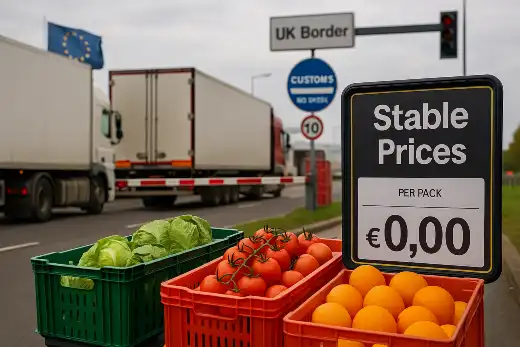The government has stepped back from introducing new border inspections on fruit, vegetables and other agri-food products from the EU, pausing measures that many in the sector feared would add costs and slow down supplies.
The move comes ahead of a sanitary and phytosanitary (SPS) deal with Brussels, which officials say will create a shared framework for plant and animal health. In practice, it means that most routine checks on food imports from the continent will not take place, easing a long-running headache for farmers, hauliers and retailers.
Relief for fresh produce traders
For the fresh produce industry, the timing is significant. September marks the start of the peak import season, when UK supermarkets rely heavily on fruit and vegetables coming in from Spain, the Netherlands and Ireland. Importers have long warned that new physical checks at ports would risk delays of hours — and in the case of fresh goods with shelf lives measured in days, that could mean entire consignments going to waste.
“Even a two-hour hold-up can ruin a lorry of lettuce,” one Kent-based distributor told GSN. “The suspension gives us a fighting chance of keeping prices stable through the autumn.”
What has been suspended
The planned regime would have required border checks on:
- Live animals imported from the EU.
- Certain “non-qualifying goods” from Northern Ireland and the Republic of Ireland.
- A set of high-risk plant and animal products.
Those checks are now on hold. Fruit and veg imports will continue to pass through without inspection. Some consignments will still need to be pre-notified and certified, but routine stops at ports have been ruled out. Live animals may be examined at their destination if risk assessments demand it.
Baroness Hayman, the UK’s Biosecurity Minister, said the new approach would “cut cumbersome bureaucracy and make trading food with our biggest market both cheaper and easier”.
The cost of stop-start policy
The decision has been welcomed, but it also underlines years of uncertainty that have left businesses footing the bill for infrastructure that may never be used.
- The British Ports Association says more than £4.7 billion has been spent by government and industry on post-Brexit border facilities, with some sites now mothballed.
- Logistics group PML Seafrigo has invested £7 million in a customs hub that could soon be redundant.
“It feels like we’ve been asked to prepare for a storm that never came,” said one port operator. “We’ve built the shelters, hired the staff — and now we’re told the weather’s fine.”
A step towards alignment
The UK is now moving closer to the position of countries such as Switzerland and Norway, which align closely with EU SPS rules and therefore face minimal checks on cross-border food trade. For UK retailers, that alignment could mean fewer shortages and a smoother flow of goods from their largest source market.
The suspension also follows a similar announcement in June, when ministers cancelled planned checks on EU fruit and vegetable imports to ease summer supplies.
What happens next
The suspension will be reviewed regularly. Officials insist biosecurity remains a priority, with surveillance teams continuing to monitor for disease and pests. Businesses must still comply with the Border Target Operating Model (BTOM), which sets out risk-based checks.
For now, importers are taking the news as a reprieve rather than a resolution. “It gives us breathing space,” said one supermarket sourcing manager. “But until the EU deal is finalised, we’re planning for the next U-turn.”



